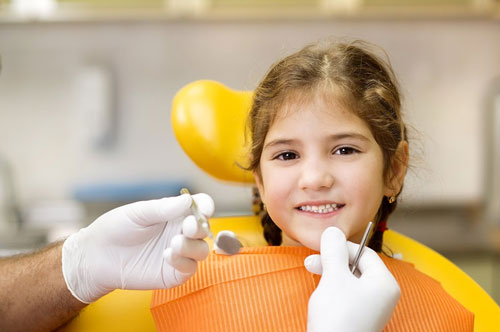This is the third in a four-part series that will appear on Fridays focusing on dental issues for families with children.
By their 6th birthday, most children should be able to brush and floss their teeth on their own without supervision.
It’s also when you can expect a new set of oral health issues to begin. This is the time when your children may start losing their primary or baby teeth to make room for their permanent or adult teeth.
Your children also may begin participating in organized sports, which is a good time to discuss the importance of athletic mouthguards. That is just one of the preventive measures you can take to help protect your family’s teeth.
Today, Beaumont Family Dentistry will be discussing what to expect during this transitional time in your child’s life. Whether you live in Lexington, Winchester, or anywhere else in Central Kentucky, our dentists are ready to assist you as your children are getting older.
Losing Teeth
Many children will lose their first baby tooth around the age of 6 or 7. They will continue losing baby teeth until around 12 or 13 years old.
No two children are exactly alike. One of your kids may be an explorer while the next clings to your leg when he or she goes into a new place.
Likewise, kids can react a wide range of ways to losing their baby teeth. Some kids will be excited about the experience (and not just because of visits from the Tooth Fairy).
Other kids may be nervous or worried that something is wrong. Explain to them that this is a normal part of growing up and the new teeth will be coming to replace the ones that fall out.
Most of the time it’s best to let teeth fall out naturally. This can take days or even months from the time your child first notices that a tooth is starting to become loose.
An adult tooth may take a few months to erupt. However, if a tooth falls out and the permanent one does not appear within six months, please make an appointment with one of our dentists.
In some cases, there may be some bleeding when a tooth falls out. Gargling with warm water is a good idea. If your child notices any pain, a topical anesthetic (such as Orajel) can help.
Also, remind your child that is important to continue brushing and flossing during this time. However, they should avoid brushing too hard in places where teeth have fallen out.
Protecting Teeth
Lots of children love participating in youth sports. Soccer, volleyball, basketball, and football are just a few examples of what are considered high-impact sports.
As a general rule, if a sport involves lots of running, jumping, contact, and quick changes of direction, it’s a good idea to wear an athletic mouthguard. Those impacts don’t just affect ankles and knees. They can be felt throughout the body, including in the joints in their jaws.
Mouthguards should be worn when children are practicing or playing these sports, according to the American Academy of Pediatric Dentistry (AAPD) and the American Dental Association.
Like seat belts, athletic mouthguards can’t stop an accident from happening, but they can greatly reduce the risk of serious injury as a result of those accidents.
In its most recent policy on preventing orofacial injuries, the AAPD noted that nearly one-third of children’s dental injuries occurred while playing sports.
Any mouthguard is better than nothing, but the best protection comes from a custom-fitted athletic mouthguard, like the kinds that we can make at Beaumont Family Dentistry.
Additional Preventive Steps
Protecting against injuries from falls, collisions, and sports equipment is important, but we shouldn’t forget that other threats, like tooth decay, are always present.
It’s always a good idea to remind your children to brush twice a day and to floss every day. You also should continue bringing them to the dentist office for routine cleanings and examinations. This way our dental professionals can remove any plaque or tartar buildup, and we can watch for sign of cavities or other problems.
Two other things to consider are fluoride treatments and dental sealants.
Fluoride is a mineral that can repair minor damage and strengthen the enamel of your children’s teeth. Dental sealants are a protective barrier that can reduce your child’s risk of getting cavities on his or her most vulnerable teeth.
Play Safe
Doing a few small things like getting athletic mouthguards, dental sealants, and fluoride treatments can help protect your children’s teeth for years to come. All of these services are available at any Beaumont Family Dentistry in Lexington.
To learn more or to make an appointment, just call or fill out an online form for the office that you prefer.

